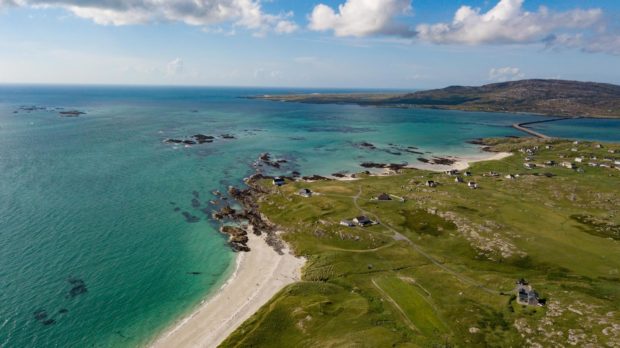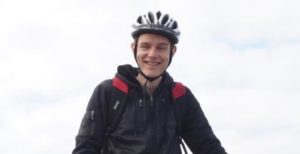Climate change is not just a thing that’s taking place far, far away, as Father Ted might put it. It’s right here on our own shorelines, and if you’ve seen the recent BBC film of South Uist crofter Iain MacDonald explaining how the machair has receded in his own lifetime you’ll have seen clear evidence of it.
I know there’s a pleasant-looking side to it. I’m convinced our winters are warmer (and wetter) than they used to be, and this winter I saw the gorse, which normally doesn’t begin to bloom again until early spring, already blossoming yellow in December. And I recall those long, snowy winters in Aberdeenshire when I lived there in the 1970s and 80s, when my dear colleague John Duncanson, who passed away recently, would ski into work from Lumphanan to the Grampian TV studios at Queens Cross.
Dear lovely and much-missed John – the consummate kind professional from whom I learned so much about staying calm in a busy news studio. To speak slowly and clearly to camera, as if you were speaking to one person in her living room and not to thousands who were watching. The only person that really mattered was Mrs Gillicuddy watching North Tonight as she ate her mince and tatties in Bridge of Don, or Banff or Buckie or west to Bonar Bridge and beyond.
The weather has always fascinated us, because so much depends on it. The crops of course, and the welfare of your family and livestock, but also the “simple” realities of daily living. Island communities in particular have always been weather-dependent: if a gale is blowing, that ferry service is not likely to run. I know the reality of being weather-bound for days and days during a long dark winter. A good pot of broth on the stove gets you through it.
But we’re talking of bigger things. Of rising temperatures, glacier and ice-sheet melts, greenhouse gas emissions, permafrost thaw, sea-ice decline, ocean acidification increase, North Atlantic surface temperature decrease, rising sea-levels and so on and so forth. The list is so long and comprehensive that it can all seem so overwhelming and hopeless – that the thing is beyond us.
But the global Covid crisis and the rapid development of a vaccine is evidence in itself that when the world gets together and invests in its science and scientists and engineers (and artists) miracles take place. The same panic, commitment and investment is now needed to tackle the even bigger danger that universal climate change brings with it.
And despite our sense of hopelessness there is much that we can do as individuals and as communities. Just as washing our hands and wearing masks and socially- distancing and obeying the varying lockdowns bought us time, so too will our individual, local and communal efforts purchase us time in the global effort to avoid climate disaster. We can do our bit.
Shop locally. Get rid of all that plastic. Buy organic produce. Grow our own food as best we can – on crofts, in gardens big and small, even on your window sill in the city. Herbs can be grown in pots, and though you may feel you’re not doing much by growing mint or thyme or parsley in your window, there’s nothing like eating what you have grown yourself. It encourages you to go further.
I see that Covid has also made millions wary of public transport and increased our reliance on individual cars. We need to get that confidence back that it’s safe as well as environmentally better to travel by bike or bus or train rather than in our individual steel bubbles. And let’s fly less – surely Zoom works as well as zooming through the skies? Let’s walk more too.
This all requires not just individual effort but a collective political will matched by action. Our cities need to become much greener, and our rural areas need investment in better transport links. It’s all good and well to talk of the advantages of public transport, but if the bus or train or ferry only runs once a day (and in many so-called “remote communities” not at all) then it’s less than useless.
I suppose there are still climate change deniers as there are mask-wearing and vaccine deniers. Any covid ward ought to dispel the latter, and any beach in the Hebrides ought to persuade the others.
The good Lord made the earth only once. Our job is to work it and take care of it.
Angus Peter Campbell is an award-winning writer and actor from Uist.

